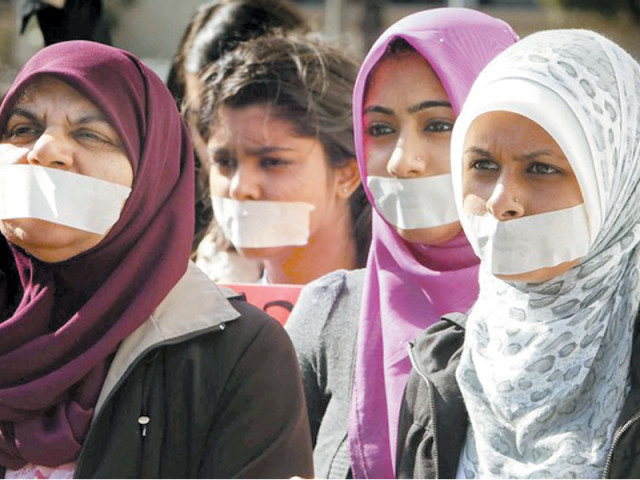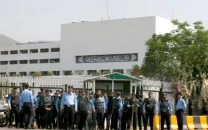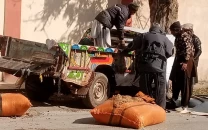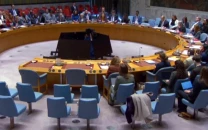No you can’t
The prosecution of the Irvine 11 points towards increasing intolerance and Islamophobia in the United States.

No you can’t
As the verdict was announced, shouts and wails came from the crowd of over 150 people who had gathered to watch the proceedings. The outcry was such that the judge, Justice Peter J Wilson cautioned people to control their passions or face eviction from the courtroom.
This was the culmination of a two-year trial that had riveted the attention of American-Muslim community and civil rights groups, highlighted the increased polarisation within America and raised questions about the very freedoms and rights that are so famously enshrined in the American constitution.
That’s because the ‘Irvine 11’, as they have been dubbed, are not terrorists or radicals, but simple students. And they were found guilty not of conspiring to commit acts of terror, but rather of conspiring to disrupt the speech of the Israeli ambassador to the US. Not with bombs or guns, but with words.
“We are now in the Muslim civil rights era,” says Nassar, a first-generation Palestinian-American studying at the University of California, Riverside. Originally from Gaza, his family had been displaced from its homeland due to Israel’s aggressive policy of operations and occupation and many of his family members were forced to move from lands that had belonged to their ancestors for generations. Others fell victim to more recent military operations, and were conveniently written off as terrorists or as collateral damage. Faceless victims of Operation: Cast Lead.
“My family had always tried to keep my cousins away from politics, but my cousins were killed in the 2008-2009 bombing campaign on the Gaza Strip,” recalls Nassar with a sigh. He was one of the lucky ones. His grandparents had left Gaza in 1948 and he had lived in California since his childhood. “Their deaths had a deep impact on me; I could no longer stay quiet about the atrocities being committed in Palestine. The reality was so very different from what was being depicted here in the US.”
Nassar’s twin pursuits of activism and academics would collide on February 8th, 2010 when the nearby University of California, Irvine decided to host a talk regarding, “US & Israel: Relations from a Historical and Personal Perspective.” When they learned that Michael Oren, the Israeli ambassador to the US, was scheduled to speak, Nassar and his fellow activists decided to use the venue to draw attention to Israel’s actions by disrupting the speech.
As Oren began to speak, protestors stood up one by one and hurled accusations before leaving the auditorium. “You sir, are an accomplice to genocide,” announced one protester. Having said their piece, they were escorted out of the auditorium by security guards. It was textbook heckling, and it was hardly unprecedented. In 2009, a similar protest was held at the University of Chicago when former Israeli president Ehud Olmert was speaking. During that event, a coalition of campus groups including Muslim, Palestinian and Human rights activists interrupted the former premier repeatedly, finally forcing him to cut his speech short. A year earlier, Israeli President Shimon Peres faced the same treatment from protestors at the UK’s Oxford University. In the same Californian county as Irvine, former US Vice President Dick Cheney was heckled by protestors who called him a war criminal. Even one of US President Barack Obama’s speeches was disrupted by an AIDS activist. No charges were pressed. No one was prosecuted.
But this time, when the 11 protesters walked out of the auditorium, they were arrested and charged. The university, which then threatened them with expulsion, also suspended the Muslim Student Union which they accused of having organised the protest.
While pro-Israeli groups cheered the action, others saw a long-standing tradition of free speech and protest being endangered. Traditionally, American campuses have been at the forefront of change. From the civil rights movement to the Vietnam War and beyond, it was students who were among the torchbearers of change, and since then, universities have jealously guarded their freedoms.
To Diala Shamas, a graduate of the Yale school of law who has worked with B’Tselem, the Israeli Information Centre for Human Rights in the Occupied Territories and Adalah, the Arab Center for Minority Rights in Israel, it’s a case of history repeating itself. “This is just the most recent iteration in a long history of law enforcement targeting of student groups,” she says. “In the past, it’s been anti-war student groups, or black student groups that have been the victims to such policies.” Nevertheless, she warns that the Irvine 11 case has deeper implications. “We should hope that this is a one-off, extreme incident rather than the beginning of a new pattern,” says Shamas. “But regardless, it is sufficient to have a chilling effect on students in general and Muslim students in particular from partaking in healthy activism.”
Increasingly, it seems that campus activism, and even heckling, is fine so long as you don’t criticise Israel in the process. The unspoken taboo isn’t just limited to students though, and former US president Jimmy Carter in fact complained of great difficulty in gaining access to a number of universities to discuss his new book Palestine: Peace not Apartheid. Well-known academics such as Norman Finklestein and Terri Ginsberg have both claimed they were denied tenure due to their open criticism of Israel.
Third-year Yale Law Student and member of Students for Justice in Palestine Yaman Salahi feels the change can be traced to a concerted campaign to promote Islamophobia by right wing and pro-Israeli interest groups. Citing a report by CBS news’ Max Blumenthal titled ‘The Great Islamophobic Crusade’, Salahi said that there was a genuine attempt to create and promote Islamophobia in the United States. The report, which was published in December last year, explains that the ‘Islamaphobic crusades’ are an organised effort first bankrolled by Israeli and Jewish-American lobby groups and eventually expanded during the Obama Presidency into a right-wing effort to ‘culturally maintain’ the United States. With private donors pumping millions of dollars, the campaign, according to Blumenthal, ‘now belongs to leading Republican presidential candidates, top-rated cable news hosts, and crowds of Tea Party activists.’
Despite the odds and the spectre of permanent criminal charges on his record, Irvine protester Tahir Herzullah refuses to remain silent. “One of the most important things to learn from the Irvine 11 case is that our community must understand that in order for any change to occur in the status quo, sacrifices need to be made,” says Herzullah. “Complacency and consideration don’t work with people who are actively trying to put you down. There needs to be a more proactive and assertive strategy when it comes to Muslim civil rights and the Palestine issue in this country.”
Herzallah, whose family originally hails from Gaza, notes that campus debate on Palestine increased after 9/11, but so did Islamophobia and surveillance. “The government, and especially the FBI, has not been an ally of [Muslim and Palestinian] student groups on campus. Just this year, the FBI issued subpoenas and searched the homes of student activists in the Midwest in an attempt to stifle the work they do,” says Herzallah. “As for what else the state is doing, all I can say is that the state is capable of anything and the Irvine 11 case is a testament to that.”
Meanwhile in Irvine, Anila Ali, a well-known community leader and activist in the Pakistani and Muslim community, works tirelessly to dispel stereotypes by advocating a proactive approach. Understanding that perceptions cannot change overnight, she stresses that the Muslim community will also have to go through its own process of assimilation and acceptance.
While she feels the university should not have taken the extreme step of pressing charges and threatening the students with expulsion, she says the protest could have been conducted in a less disruptive way.
For her, the way forward is for Muslim youth to participate more fully in civic life. Some of the projects she is conducting include inter-faith harmony initiatives to develop better community awareness and counter Islamophobia.
She maintains that despite the stigma, negative perceptions and polarisation, Muslims in the United States still have civil liberties and freedoms that they are otherwise denied in many other countries.
“Law enforcement agencies like the LAPD, our government, the Department of Justice and the White House are all engaged in reaching out to Muslims in an effort to build relationships and close gaps in understanding and bring the Muslim community into mainstream America,” says Ali. “American Muslims are truly fortunate to have the protection of their civil liberties even after the monstrous crime of 9/11, which was perpetrated by so-called Muslims.”
Regardless, the question as to whether civil liberties are being protected has been up for debate. Shaheen Nasser and Taher Hazerullah who maintain that America is their home, feel that prosecution had gone out of its way to pursue the case simply because of their ethnicity and religion.
“We weren’t prosecuted because we did something illegal,” says Nassar. “We were prosecuted because we were Muslim and because they tried to silence our message. We felt like black men in 1950s America and even during the jury selection process some of the questions aimed at the potential jurors made us feel that we were suspect simply because of who we are, that we were criminals because of our religion and our skin tone.”
Support for the Irvine 11 has come from many quarters, including Jewish peace activists who have drawn attention to what they see as blatant discrimination. In a statement posted on their website, the group Jewish Voice for Peace wrote: Our young Jewish members were engaged in a nearly identical protest of Israeli policies — only the venue was larger and the target was the Prime Minister of Israel, Bibi Netanyahu. They were let off without even a mark. Their Muslim peers were tried and criminalised. What does this say about America today?
Published in The Express Tribune, Sunday Magazine, December 4th, 2011.


















COMMENTS
Comments are moderated and generally will be posted if they are on-topic and not abusive.
For more information, please see our Comments FAQ